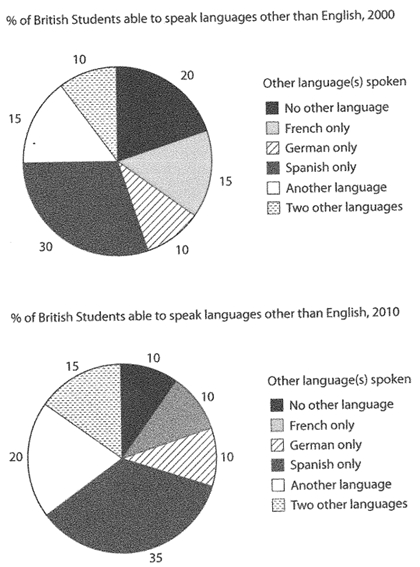Please give me a Ielts score for this essay. Tks!
The charts below show the proportions of British students at one university in England who were able to speak other languages in addition to English, in 2000 and 2010. Summarise the information by selecting and reporting the main features, and make comparisons where relevant. Write at least 150 words.
Given are two pie charts depicting the percentage of British undergraduates in England by the years 2000 and 2010. The figures have been presented for comparison purposes according to the six status of students' ability to speak additional languages namely, No other language, French only, German only, Spanish only, Another language and Two other languages.
Overall, the most widely spoken language among tertiary students remained Spanish at roughly a third. Otherwise, one in ten British university students continued to be a German-only speaker. This was the smallest proportion that the numbers accounted for in both years mentioned.
The data collected shows that some 2010's foreign languages saw their moderate popularity gain by 5% each. First, 35% of British undergraduates in England were able to communicate in Spanish only, 5% higher than ten years before. Likewise, the number of students who were conversant in another language started at 15% in 2000 and amounted to 20% in 2010. The 5% growth can also be observed in the figures of 2000 and 2010 for college students in England with a command of two extra languages.
On the other hand, compared to the beginning of the century, British would-be graduates who were able to converse in French reduced remarkably by 5% while 10% more of them could speak at least one language in addition to their mother tongue in 2010. Furthermore, those totalling the same 10% of undergraduates in England as did German-only speakers were either trilingual in 2000 or French-only speakers in 2010.
British students speaking other languages
The charts below show the proportions of British students at one university in England who were able to speak other languages in addition to English, in 2000 and 2010. Summarise the information by selecting and reporting the main features, and make comparisons where relevant. Write at least 150 words.
Given are two pie charts depicting the percentage of British undergraduates in England by the years 2000 and 2010. The figures have been presented for comparison purposes according to the six status of students' ability to speak additional languages namely, No other language, French only, German only, Spanish only, Another language and Two other languages.
Overall, the most widely spoken language among tertiary students remained Spanish at roughly a third. Otherwise, one in ten British university students continued to be a German-only speaker. This was the smallest proportion that the numbers accounted for in both years mentioned.
The data collected shows that some 2010's foreign languages saw their moderate popularity gain by 5% each. First, 35% of British undergraduates in England were able to communicate in Spanish only, 5% higher than ten years before. Likewise, the number of students who were conversant in another language started at 15% in 2000 and amounted to 20% in 2010. The 5% growth can also be observed in the figures of 2000 and 2010 for college students in England with a command of two extra languages.
On the other hand, compared to the beginning of the century, British would-be graduates who were able to converse in French reduced remarkably by 5% while 10% more of them could speak at least one language in addition to their mother tongue in 2010. Furthermore, those totalling the same 10% of undergraduates in England as did German-only speakers were either trilingual in 2000 or French-only speakers in 2010.

ielts11test2task.jpg
